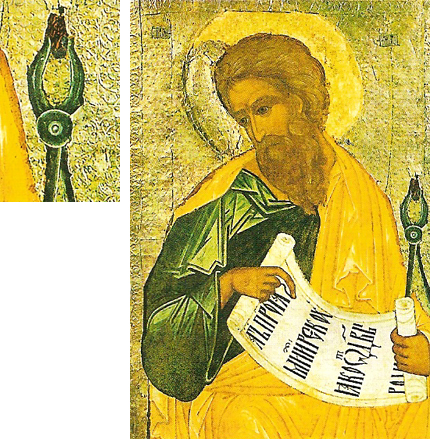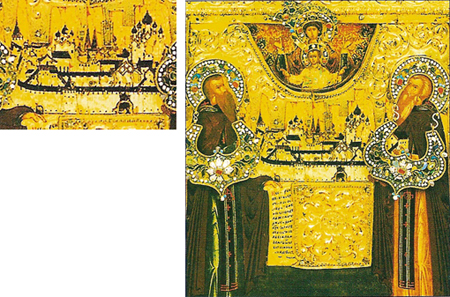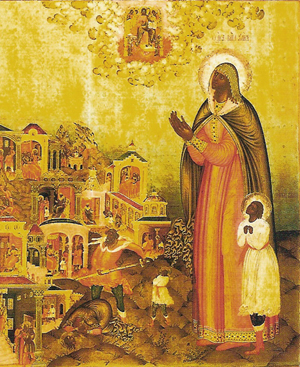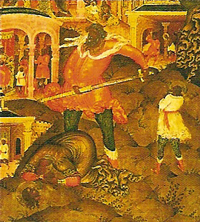Saint Nikodemos The Hagiorite
Unseen Warfare
Self-love and high opinion of ourselves give birth in us to yet another evil which does us grievous harm; namely, severe judgment and condemnation of our neighbours, when we regard them as nothing, despise them and, if an occasion offers) humiliate them.
This evil habit or vice, being born of pride, feeds and grows on pride; and in turn feeds pride and makes it grow. For every time we pass judgment our pride takes a step forward, through the accompanying effect of self-importance and self-gratification.
Since we value and think of ourselves so highly, we naturally look at others from on high, judge and despise them, for we seem to ourselves far removed from such faults as we think others possess. And here, seeing our evil disposition, our ever-wicked enemy stands by watchfully and, opening our eyes, teaches us to keep a sharp watch for what others say and do. From these observations he makes us draw conclusions as to their thoughts and feelings; and, on these suppositions, form an opinion of them, generally not good, exaggerating this supposed defect into a deep-rooted feature. These judges do not see and realise that the very origin of their judgment, the suspicion of wrong in others, is impressed on the mind by the action of the enemy, and then fanned by him into a conviction that they are actually such, although it is not so at all.
So, brother, since the enemy watches you constantly, waiting for an opportunity to sow evil in you, be doubly watchful over yourself, lest you fall into the nets spread for you. As soon as he shows you some fault in your neighbour, hasten to repel this thought, lest it take root in you and grow. Cast it out, so that no trace is left in you, and replace it by the thought of the good qualities you know your neighbour to possess, or of those people generally should have. If you still feel the impulse to pass
judgment, add to this the truth, that you are given no authority for this and that the moment you assume this authority you thereby make yourself worthy of judgment and condemnation, not before powerless men, but before God, the all-powerful Judge of all.
This reversal of thoughts is the strongest means, not only for repelling accidental critical thoughts, but also for completely freeing yourself of this vice. The second method, equally very strong, is never to let go from your mind the memory of your own wickedness, your unclean and evil passions and actions, and correspondingly to hold on to the constant realisation of your own unworthiness.
You will certainly find in yourself no small number of such passions and passionate actions. If you have not given up and shrugged your shoulders, saying: ‘Come what may”, you cannot help caring about finding a cure for these ills, which are killing you. But if you act sincerely in this, you should have no time free to concern yourself in the affairs of others and to pass sentence on them.
For then, if you let yourself do this, the sayings will keep ringing in your ears: “Physician, heal thyself” (Luke iv. 23). “First cast out the beam out of thine own eye” (Matt. vii. 5).
Moreover, when you judge severely some wrong action of your neighbour, you must know that a small root of the same wickedness is also in your own heart, which, by its passionate nature, teaches you to make suppositions about others and to judge them. “An evil man out of the evil treasure” (of the heart) “bringeth forth evil things ‘ (Matt. xii. 35). But an eye, that is pure and without passion, looks too without passion on the actions of others, and not with evil. “Thou art of purer eyes than to behold evil” (Habakkuk i. 13).
Therefore when the thought comes to condemn another man for some fault, be indignant with yourself as a perpetrator of the same actions and guilty of the same fault; and say in your heart: ‘ Unworthy as I am, how can I raise my head to see the faults of others and accuse them, when I am submerged in the same sin and my trespasses are even greater?’ By doing this you will turn against yourself the weapon, which evil thought urges you to use against another; and instead of wounding your brother you will put plasters on your own wounds.
If the sin of your brother is not hidden but obvious to everyone, try to see its cause, not in what the wicked passion for judging suggests, but in what a brotherly feeling towards him may indicate, and say to yourself: since this brother has many hidden virtues, so, to protect them from being harmed by vainglory, God has allowed him to fall into the present sin, or to stay a short time in this unbecoming guise, so that he should appear unworthy in his own eyes and, being despised for it by others, should gather the fruits of humility and become even more pleasing to God; in this way the present instance will do him more good than harm.
Even if a person’s sin is not only obvious, but very grievous and comes from a hardened and unrepentant heart, do not condemn him, but raise your eyes to the wondrous and incomprehensible judgments of God; then you will see that many people, formerly full of iniquity, later repented and reached a high degree of sanctity, and that, on the other hand, others, who were on a high level of perfection, fell into a deep abyss. Take care, lest you also suffer this calamity through judging others.
So stand always on guard in fear and trembling, fearing more for yourself than for others. And be assured that every good word you may utter for your neighbour, and every rejoicing for his sake is the action and fruit of the Holy Spirit in you, whereas every bad word and scornful condemnation comes from your evil nature and suggestions of the devil. Therefore, when you are tempted by some wrong action of your brother, do not let your eyes sleep until you have driven this temptation from your heart and wholly made peace with your brother.
Taken from "Unseen Warfare" By St Nikodemos The Hagiorite







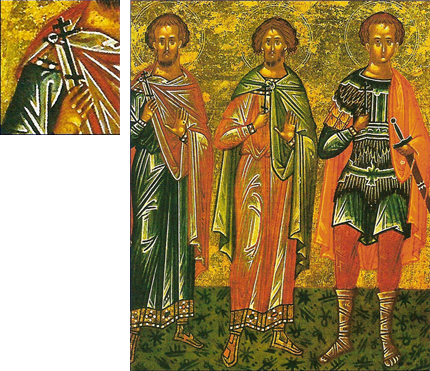
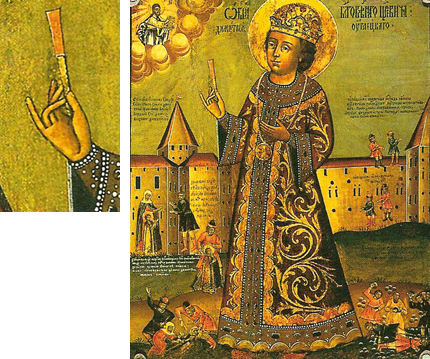
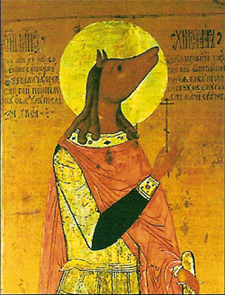 It is known that St. Martyr Christophor who lived in Egypt in the III century was very handsome. To flee temptations, he begged God to change his appearance, to make him repulsive. God granted his request. In icons, he is portrayed as having a dog’s head. I do not think he really had a dog’s head, though God can do anything, it is just to show that his appearance became ugly. They exaggerate this motive in icons in order to emphasize the saint’s deed and to focus the attention of the person praying before the icon.
It is known that St. Martyr Christophor who lived in Egypt in the III century was very handsome. To flee temptations, he begged God to change his appearance, to make him repulsive. God granted his request. In icons, he is portrayed as having a dog’s head. I do not think he really had a dog’s head, though God can do anything, it is just to show that his appearance became ugly. They exaggerate this motive in icons in order to emphasize the saint’s deed and to focus the attention of the person praying before the icon. 